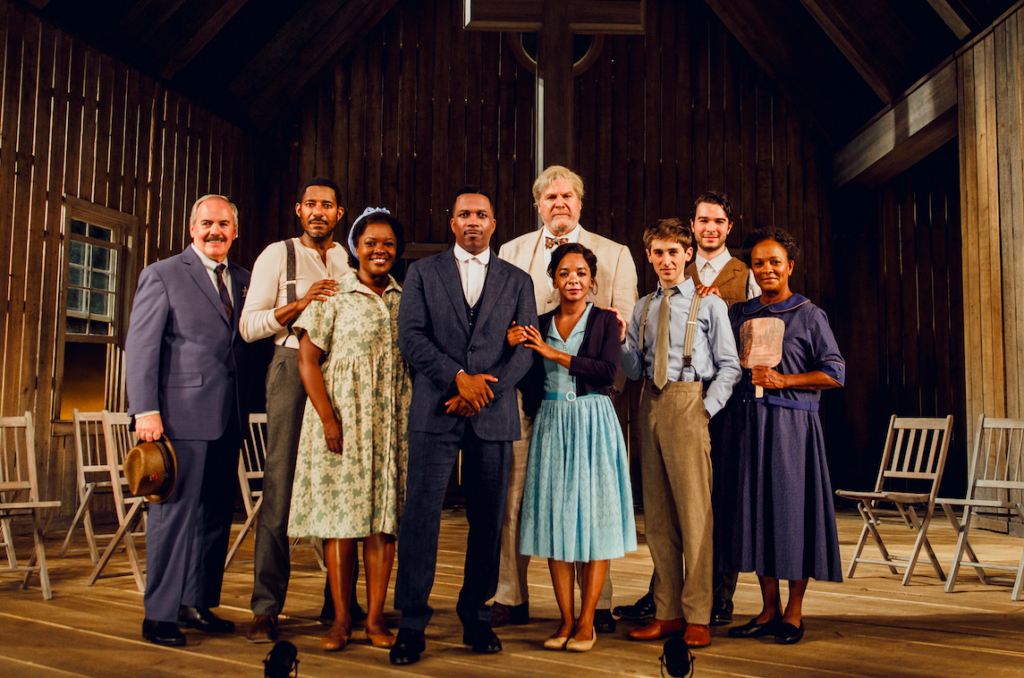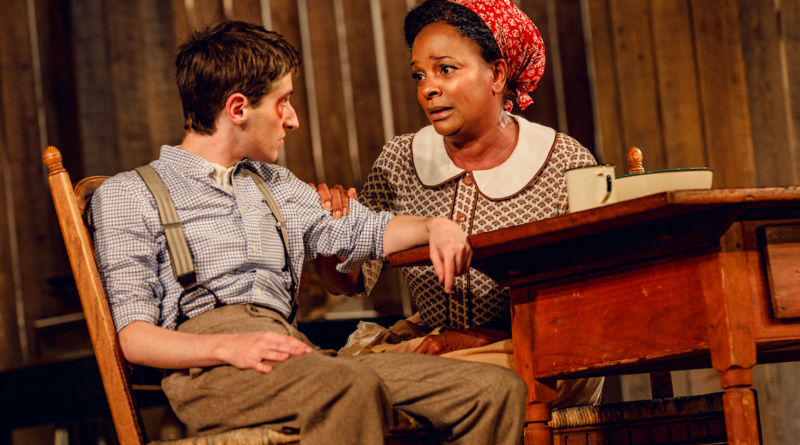INTERVIEW: Noah Robbins on honoring Ossie Davis’ vision in ‘Purlie Victorious’
Photo: Purlie Victorious stars Noah Robbins and Vanessa Bell Calloway. Photo courtesy of Marc J. Franklin / Provided by Polk & Co. with permission.
The Broadway revival of Ossie Davis’ Purlie Victorious: A Non-Confederate Romp Through the Cotton Patch, starring Leslie Odom, Jr. and directed by Kenny Leon, is currently playing an extended run at the Music Box Theatre in Midtown Manhattan. One of the pivotal characters in the show is Charlie Cotchipee, played by Noah Robbins, an alum of Broadway’s To Kill a Mockingbird, Brighton Beach Memoirs and Arcadia.
Charlie is a complicated character. His father, Ol’ Cap’n Cotchipee (Jay O. Sanders), is a racist white man attempting to exert his power in the segregated South, but Charlie is more progressive and welcoming, including to Odom’s character of Purlie Victorious Judson and Kara Young’s Lutiebelle Gussie Mae Jenkins. The cast also features Heather Alicia Simms, Billy Eugene Jones, Vanessa Bell Calloway, Bill Timoney and Noah Pyzik.
The show, set in the “Recent Past” in “The Cotton Plantation Country of the Old South,” makes the audience laugh on a nightly basis, but behind the laughs is a biting social commentary that tackles serious and important issues. In many ways, Davis, both an actor and writer, wanted to dig deeper into the American past (into his own past) with the clever and deceptive tool of comedy. That doesn’t jettison the pain inherent in the situations depicted on the stage; instead, the company is able to step further into the horrible realities and repercussions of racism, and make connections to today’s society as well.
“I hadn’t really heard of the play, which the more I worked on this play, the more amazed I am that it’s not as well known as it should be,” Robbins said in a recent phone interview. “I started reading it, and I was laughing by myself, which was, when you think about, a pretty rare experience to be reading something by yourself and laughing out loud, at least for me. I was just like, I can’t believe this play hasn’t been done a million times. It holds up so beautifully, and to write a satire in the ‘60s that still rings true in 2023, regardless of the themes or the message, just to have written jokes that hold up that well after so long, is just a monumental achievement. So I just loved it, and I was really excited to do it. It’s exceeded even my expectations of how much the audiences have loved it, how much the cast loves doing it every night. It’s been a blast.”
Robbins said that the ensemble of actors followed Leon’s lead and tried to understand the “reality” of these characters and the situations they find themselves in. The show follows Purlie as he preaches in the local community and tries to reclaim his inheritance. Standing in his way is Charlie’s father.
“You just have to make these people real and find the reality of all of it, but it was very clear to all of us, I think, that the audience was going to be crucial,” Robbins said. “So the director, Kenny Leon, had small groups of people come to the rehearsal space and watch run-throughs toward the end of the rehearsal process, which was invaluable. … I think it was very important that we not lose sight of the fact that this was going to be a show that had a very palpable audience presence, even if you weren’t necessarily going for the laughs, so those groups of people that came with the rehearsal were super-valuable. … The play is a piece of music that you play every night, and it’s always different. But it’s always got to be somewhat the same. The audience, it’s always the last piece of the puzzle the audience, but I think this play more than any other play I’ve ever done, it’s really a crucial, crucial piece.”
Throughout this project, Robbins has come to learn more about Davis and his life. Born in 1917 in Georgia, the playwright was educated at Howard University and began his theatrical career in 1939 in Harlem, according to his official biography. His Broadway debut came a few years later in Jeb, and that’s when he met his creative and personal partner, Ruby Dee.
“Ossie Davis, when he first set out to write this play, he was writing about his childhood in the segregated South,” Robbins said. “It was so painful for him to write that he realized it was actually too painful to make an audience sit through, so he decided to make it a comedy. But that pain, he was still writing from the same place. He made it a comedy so that the audience could feel invited in and feel safe to approach these really painful, serious topics. So the seriousness is so interwoven into the comedy that there’s really no doing it without addressing what’s really going on in these scenes. … It felt very healing to approach these topics the way that Ossie Davis approached them, with humor, but also with open eyes. It was really special.”
Robbins took some time getting to know his character of Charlie. He has many speeches during the night, and they showcase his preference for progress. But still there’s the “Ol’ Cap’n” to deal with, and he keeps standing in the way of Purlie’s actions.
“In the early part of the rehearsal process, I think I was viewing [Charlie] as a character who was very much on the side of progress, but I wasn’t grappling with the fact that he is the son of a very racist, bad man,” the actor said. “I wasn’t grappling with what it is to have a father, to have a parent who is believing things and spouting things that you find abhorrent. I think it’s easy to watch the play and look at the character of my father and say, ‘Oh, what a terrible man.’ Indeed, he is a terrible man, but Charlie being his son doesn’t have that luxury of completely detaching from this guy and hating him. That’s his father, so there’s an element of a desire to make him better, a desire to really try to talk this guy out of it, to just save him from himself. That’s the conflict for Charlie, and I think that’s the really human, beautiful and painful element in his life. As much as he hates what his dad believes in and what his dad says, he finds it impossible to hate his dad. He still wants his dad to be better. He still wants to hopefully make his dad see the error of his ways.”
Robbins added: “I think that inner knot that he feels between knowing what’s right and wanting his dad to know what’s right, too, despite it all, is really where I think the heart of the character is and where I kind of land every night — really trying my best to open my dad’s eyes to what’s going on, but failing.”
By John Soltes / Publisher / John@HollywoodSoapbox.com
Purlie Victorious: A Non-Confederate Romp Through the Cotton Patch, starring Leslie Odom, Jr., Kara Young and Noah Robbins, and directed by Kenny Leon, continues on Broadway at the Music Box Theatre. Click here for more information and tickets.


